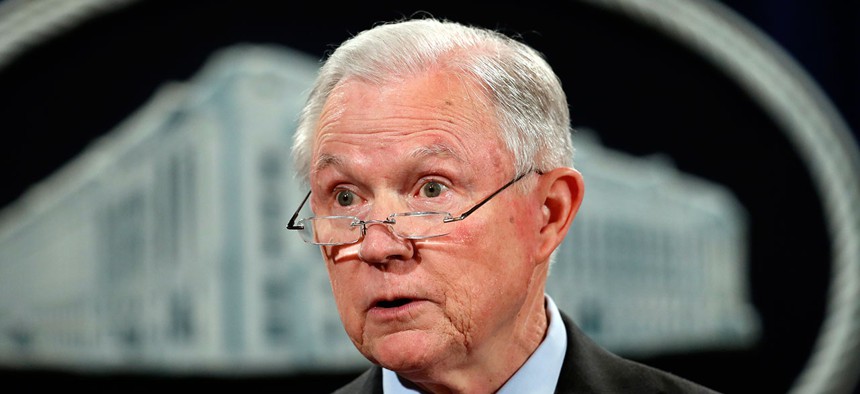Attorney General Jeff Sessions Is Cracking Down on Legal Marijuana

Carolyn Kaster/AP
The attorney general reportedly aims to close off the legal gray area that has allowed legal marijuana to flourish in more than half of U.S. states.
The pot-puffing residents of California only had a few days to enjoy a new legal regime for recreational cannabis in their state before the Trump administration pulled the rug out.
The Associated Press reports that US attorney general Jeff Sessions will close off the legal gray area that has allowed legal marijuana for medicinal or recreational purposes to flourish in more than half of US states. Tomorrow (Jan. 5), he plans to rescind a directive to federal prosecutors, called the Cole Memo, that urged them not to prosecute state-sanctioned cannabis production and distribution.
Cannabis is still classified as a controlled substance akin to heroin by federal law, despite significant empirical evidence that it is not as harmful and is potentially beneficial. The Cole Memo (pdf) provided a kludgy fix for the conflicts that emerged between state decisions to legalize marijuana use and the federal government’s continued insistence that cannabis is illegal.
Without the memo, US attorneys will use their discretion to decide whether to prosecute individuals and companies for violating federal marijuana laws. Those efforts may be complicated by a law enacted by Congress that forbids the Department of Justice from spending money to investigate state-sanctioned cannabis operations. However, lawmakers and prosecutors disagree about how far-reaching the prohibition is, and it will also need to be enacted again as part of the on-going debate on how to fund the government in 2018.
Regulating the spread of marijuana like alcohol, rather than like medicine, may help prosecutors move forward. While federal agents were reluctant to arrest cancer patients using the substance to treat chronic pain, casual users may prove less sympathetic in the public eye. Republicans have traditionally been advocates of allowing states more leeway to pursue their own policies, but under the Trump administration, federal law enforcement has proven more willing to use heavy-handed tactics in conflicts with local governments, particularly over immigration.
Sessions has long been an opponent of legalized cannabis, though his boss, president Donald Trump, has been typically erratic about how much he prioritizes the end of marijuana federalism. In 2016, he said that he wouldn’t allow his attorney general to change the status quo, telling a reporter that “I’m a states person. I think it should be up to the states, absolutely.” It’s not clear if Trump was aware of this policy change ahead of time or was consulted about it.
Marijuana advocates, now backed by a multi-billion-dollar industry and overwhelming public opinion, won’t give up without a fight. Local leaders have grown used to the millions in tax revenue marijuana puts in their hands to fund schools and infrastructure development. The toll taken by opioid addiction has also become a talking point for marijuana legalization, with advocates saying it provides a safer alternative and funds treatment programs, while opponents say it is a gateway to harder drugs.
So far, studies of drug use in states with legalized marijuana have not revealed significant negative effects and in some cases shown health benefits.
Some Democrats argue that pro-marijuana messaging could help goose youth turnout in next year’s midterm congressional elections, which they see as vital to reigning in Trump administration excesses. The newly elected Democratic governor of New Jersey, Phil Murphy, made the issue central to his campaign, and putting cannabis on the ballot in more conservative states like Arizona and Texas could boost turnout as well.
Republicans are noticing: Colorado senator Cory Gardner, who is charged with re-electing senate Republicans and whose state has been a pioneer of marijuana legalization, blasted the decision today and promised to prevent new Department of Justice appointees from being confirmed until the decision is reversed.
Many Democratic political operatives are focusing on suburban Republican lawmakers in New York and California, like Rep. Dana Rohrabacher, a conservative who has also been a long-time booster of legal marijuana. These Republicans may find Sessions’ decision to be yet another political burden from an administration that isn’t making their re-election campaigns any easier.






